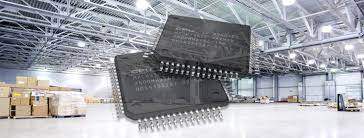Chip shortage to continue into fall: TSMC boss

In an exclusive CBS interview with Dr Mark Liu, Chairman of the Taiwan Semiconductor Manufacturing Company (TSMC), the head of the world’s largest chipmaker said the ongoing shortage of semiconductors could last several more months, until year’s end or possibly early 2022.
Liu spoke to correspondent Lesley Stahl remotely from TSMC headquarters in Hsinchu, Taiwan, in his first television interview, airing Sunday on 60 Minutes.
The chip shortage, which has forced carmakers to idle plants and workers throughout the country, has underscored the US reliance on chip manufacturing in Asia.
It has revealed how fragile the global supply chain of chips can be, and its inability to react to a sudden surge in demand, CBS reported.
TSMC is the world’s most advanced chip manufacturer. It makes the semiconductors that end up in Americans’ iPhones, the supercomputer managing the US nuclear arsenal, fighter jets and most American autos.
In March 2020, as the pandemic shut down the US, car sales tanked, leading automakers to cancel their chip orders, CBS reported. This prompted TSMC to stop making them.
But then car sales unexpectedly shot back up late last year. Automakers renewed their orders, but chip production takes time, creating the shortage that is causing carmakers to lose billions of dollars as they wait.
It’s forced Ford Motor Co., General Motors and Stellantis, formerly called Fiat Chrysler Automobiles, to idle many factories.
GM has said the shortage could cost the automaker up to US$2 billion in earnings this year.
TSMC told 60 Minutes it is focused on manufacturing the needed chips.
“We heard about this shortage in December … and in January, we tried to squeeze as [many] chip[s] as possible to the car company[ies],” Liu told Stahl. “Today, we think we are two months ahead, that we can catch up [to] the minimum requirement of our customers. By the end of June.”
But that does not mean the chip shortage will end in two months.
Liu said it will take a few more for the supply chain to right itself and there may be supply chain issues of which he is not aware, CBS reported.
“There’s a time lag,” Liu explained. “In car chips particularly, the supply chain is long and complex … The supply takes about seven to eight months.”
This means the shortage is more likely to be alleviated by year’s end or early 2022.
“Should Americans be concerned that most chips are being manufactured in Asia today?” Stahl asked Liu.
“I understand your concern,” he responded. “But this is not about Asia or not Asia, because a shortage will happen no matter where the production is located […] because it’s due to the Covid.”
The company is building a US$12 billion chip factory in Arizona, in what the company called a “strong partnership” with the US government.
US officials have expressed hope that the TSMC facility in Arizona will increase US economic independence.
TSMC, like other technology firms, has benefited from the work-and-study-from-home trend during the Covid-19 pandemic, as people rushed to buy laptops, tablets and other equipment.
Stahl also interviewed Pat Gelsinger, the new CEO of Intel, America’s largest chipmaker.
Gelsinger said his company is also working to address the car chip shortage and will reconfigure some of its fabrication plants to churn out the needed chips, CBS reported.
But that will also take a minimum of several months, and alleviating the overall tight supply in chips will take even longer.
“I think we have a couple of years until we catch up to this surging demand across every aspect of business,” Gelsinger tells Stahl.
Today, 75% of semiconductor manufacturing is in Asia.
“Years ago, the United States produced 37% of the world’s semiconductor manufacturing in the US. Today, that number has declined to just 12%,” says Gelsinger. “And anybody who looks at supply chain says, ‘That’s a problem.'”
He adds, ”This is a big, critical industry and we want more of it on American soil. The jobs that we want in America, the control of our long-term technology future.”
President Biden has proposed seeding the semiconductor industry in the US with US$50 billion in taxpayer money as part of his infrastructure plan.
Recently the White House convened a virtual emergency summit with 19 CEOs and his top advisers, to discuss a solution to the expanding crisis.
Speaking to the 19 CEOs during the portion of the meeting that was open to the press, Biden voiced support for legislation speeding up that transition.
“China and the rest of the world is not waiting, and there’s no reason why Americans should wait,” Biden said.
“We’re investing aggressively in areas like semiconductors and batteries — that’s what they’re doing … so must we,” the president said.
Stahl challenged Intel’s incoming CEO, who started in February, about Intel’s past practice of spending more money to buy its stock back over investing in R&D.
Gelsinger promises: “We will not be anywhere near as focused on buybacks going forward as we have in the past. And that’s been reviewed as part of my coming into the company, agreed upon with the board of directors.”
Photo: Taiwan Semiconductor Manufacturing Co chairman Mark Liu speaks at a Taiwan trade show in Taipei on Sept. 23 last year. Photo courtesy Taipei Times.
Link: https://asiatimes.com/2021/05/chip-shortage-to-continue-into-fall-tsmc-boss/




